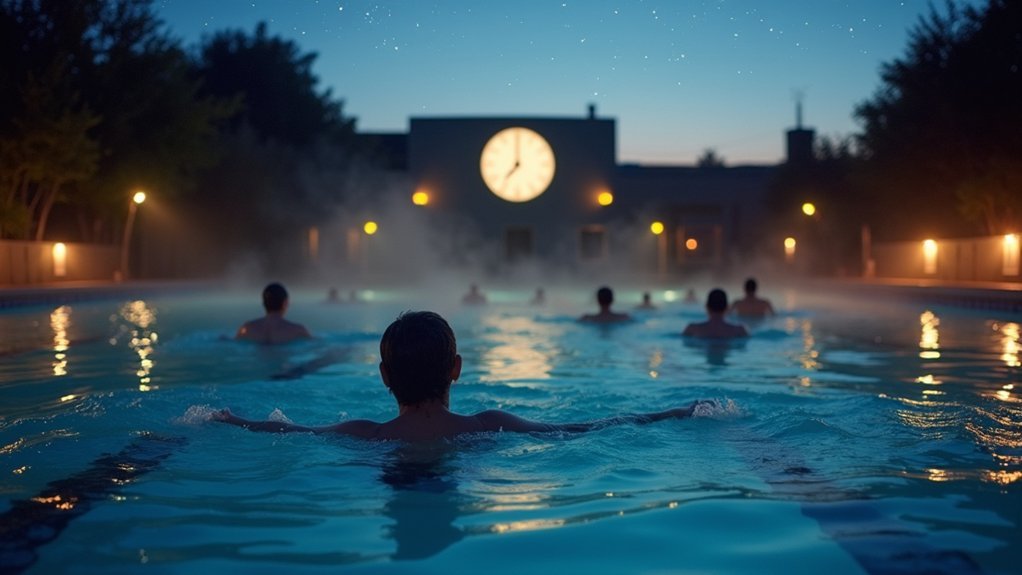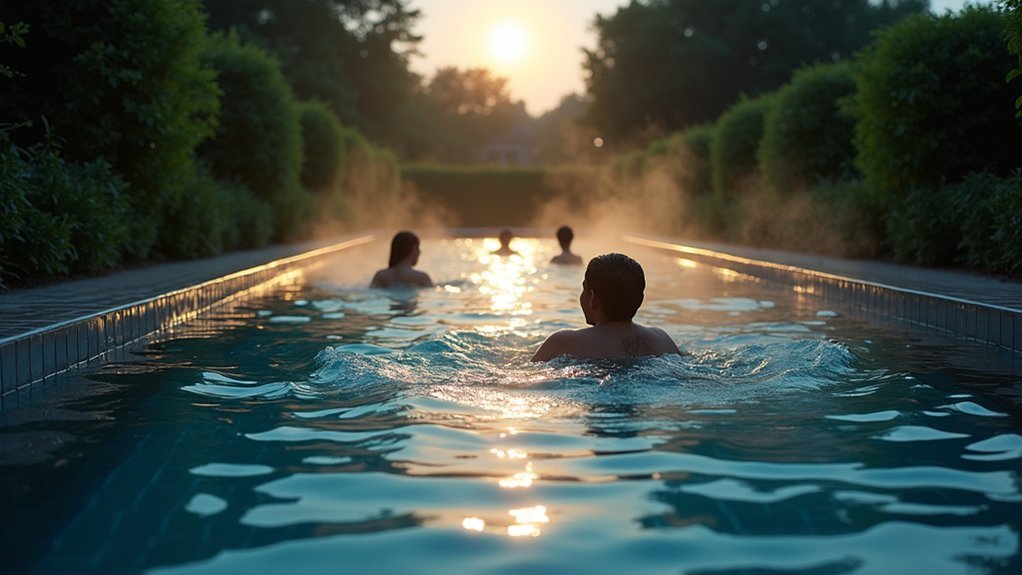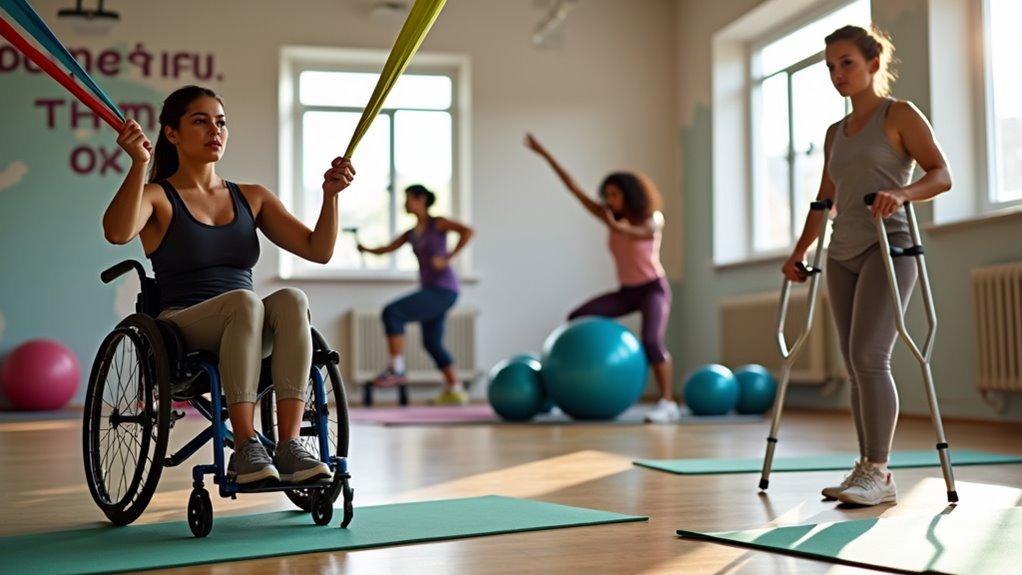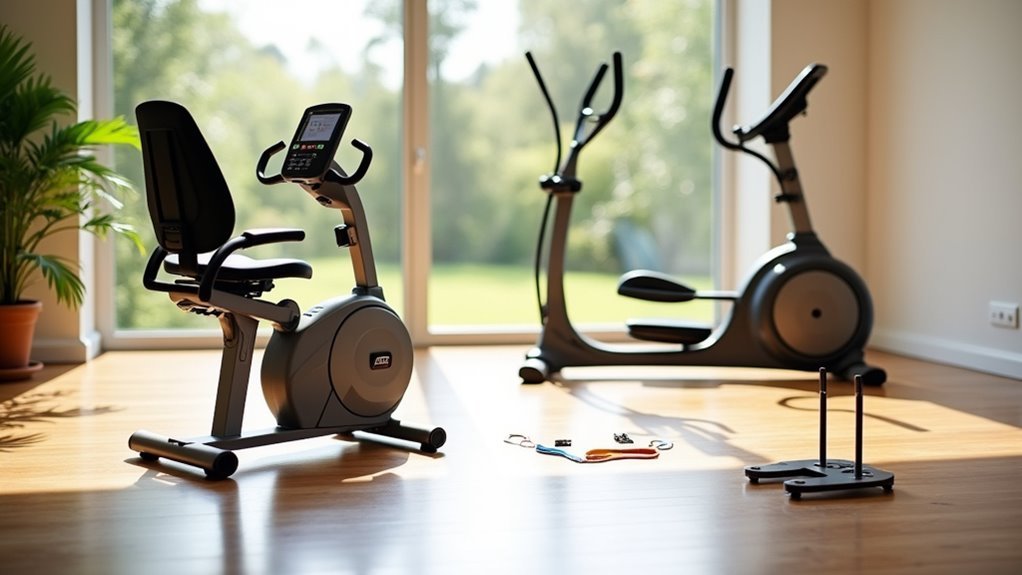You’ll sleep better after aquatic workouts because water-based exercise creates ideal conditions for rest. Swimming raises your body temperature, then triggers drowsiness as you cool down afterward. The hydrostatic pressure improves circulation while reducing muscle soreness, and endorphins released during exercise combat stress hormones like cortisol. Regular swimming increases slow-wave sleep and reduces insomnia symptoms, with 68% of swimmers reporting increased relaxation. Discover how to optimize your aquatic routine for maximum sleep benefits.
The Science Behind Water-Based Exercise and Sleep Quality

When you immerse yourself in an aquatic workout, you’re setting in motion a fascinating chain of physiological events that’ll greatly impact your nighttime rest. Your body temperature rises during water-based exercise, then drops afterward, naturally triggering drowsiness and helping you fall asleep faster.
The hydrostatic pressure you experience underwater enhances circulation while reducing muscle soreness, promoting quicker recovery.
Water’s natural pressure acts like a full-body compression garment, boosting blood flow and easing tired muscles for faster healing.
Meanwhile, your brain releases endorphins that combat stress and elevate your mood—two vital factors for achieving quality rest.
Research reveals that moderate aerobic exercise like swimming increases slow-wave sleep, the most restorative phase of your sleep cycle. This deep sleep stage is essential for overall health and well-being.
Regular aquatic workouts consistently improve sleep quality, with participants reporting fewer insomnia symptoms and better nighttime rest patterns.
Physical Benefits That Promote Better Rest
Beyond the neurological changes that occur during aquatic exercise, your body experiences distinct physical transformations that directly enhance your ability to achieve restorative sleep.
When you swim, water’s natural resistance engages multiple muscle groups simultaneously, creating beneficial fatigue that signals your body it’s time to rest.
The physical benefits that improve your quality of rest include:
- Temperature regulation – Exercise helps raise your core temperature, and the subsequent cooling effect naturally triggers drowsiness.
- Cardiovascular strengthening – Swimming enhances heart function and circulation, supporting overall physical health.
- Muscle tension release – Water’s buoyancy and gentle resistance help eliminate physical stress accumulated throughout your day.
These combined effects don’t just tire you out—they improve mood and create the ideal physiological conditions for deep sleep.
Mental Health Improvements Through Swimming

While swimming strengthens your body, it simultaneously transforms your mental state in ways that profoundly impact your sleep quality. When you swim, your body releases endorphins that naturally enhance your mental health by combating anxiety and depression.
You’ll find that 68% of swimmers report increased relaxation following water activities, directly contributing to better sleep patterns.
Swimming helps you reduce tension effectively, creating a calming effect that prepares your mind for rest. Participating in group swim classes adds social benefits that further boost your mental well-being.
Swimming’s tension-reducing properties create a calming mental state that naturally prepares your body and mind for quality rest.
Regular aquatic workouts stabilize your mood while decompressing your mind, leading to significant improvements in sleep quality. This mental transformation makes swimming particularly powerful for establishing healthy nighttime rest patterns that improve sleep consistently.
Temperature Regulation and Sleep Preparation
When you swim, you’ll experience a natural drop in body temperature that signals your body to prepare for sleep.
The water’s cooling effect on your skin and core temperature mimics the same physiological process that occurs during your natural sleep cycle.
After you exit the pool, this rapid temperature change enhances your body’s readiness for rest and helps regulate your circadian rhythms.
Body Temperature Drop Benefits
Although your body heats up during an aquatic workout, you’ll experience a significant drop in core temperature once you exit the water—and this cooling effect serves as a powerful signal that prepares your body for sleep.
This body temperature drop triggers your natural thermoregulation process, creating a relaxed state that improves sleep onset timing.
The cooling benefits work through several mechanisms:
- Faster sleep onset – Research shows quicker temperature decreases correlate with falling asleep sooner
- Enhanced drowsiness – Similar to warm baths, the cooling effect promotes natural sleepiness
- Muscle relaxation – Hydrostatic pressure combined with cooling helps release tension throughout your body
This temperature regulation mimics your body’s natural evening routine, where core temperature naturally decreases to signal bedtime, making swimming an ideal pre-sleep activity.
Water Temperature Effects
Beyond the natural cooling that occurs after exiting the pool, the actual temperature of the water you’re swimming in plays an essential role in how effectively your workout prepares you for sleep.
Cool water temperature effects create ideal conditions for regulating your core body temperature during exercise. When you swim in cooler water, your body works harder to maintain its natural temperature, leading to enhanced temperature regulation that positively impacts your sleep patterns.
The contrast between your warm body and cool water mimics the therapeutic benefits of a warm bath followed by cooling.
This temperature differential promotes deep relaxation by activating your body’s natural sleep preparation mechanisms. As your body temperature drops more dramatically after swimming in cool water, you’ll experience faster sleep onset and improved overall rest quality.
Post-Swim Cooling Process
As you climb out of the pool, your body initiates a powerful cooling process that directly prepares you for better sleep. This post-swim cooling process mimics your natural pre-sleep body temperature drop, signaling it’s time to rest.
The temperature shift creates ideal conditions for sleep onset:
- Your core body temperature decreases rapidly after leaving warm water
- Muscle relaxation intensifies as your body cools down post-workout
- Enhanced drowsiness develops through the cooling mechanism
Research confirms that faster body temperature decreases after physical activity correlate with improved sleep quality and duration.
When you swim before bedtime, you’re leveraging water’s temperature-regulating benefits alongside physical exertion. This combination effectively prepares your body for restorative sleep by triggering the biological processes that promote deeper rest.
Stress Reduction and Relaxation Response
When you exercise in water, you’re tapping into one of nature’s most effective stress-busters that directly impacts your sleep quality.
The calming mental effects of water naturally activate your body’s relaxation response, while the physical activity releases endorphins that counteract stress hormones like cortisol.
This powerful combination creates an ideal physiological state for shifting into restful nighttime sleep.
Water’s Calming Mental Effects
Water naturally triggers your body’s relaxation response, creating a powerful antidote to daily stress and anxiety. When you immerse yourself in aquatic environments, water’s calming mental effects immediately begin working to soothe your mind and prepare your body for restful sleep.
The benefits of swimming extend far beyond physical fitness, offering profound mental health advantages:
- Endorphin release – Swimming stimulates natural mood-enhancing chemicals that combat anxiety and depression
- Meditative movement – Rhythmic strokes and controlled breathing activate deep relaxation responses
- Muscle tension relief – Water’s gentle resistance reduces physical stress while promoting mental clarity
Studies show 68% of swimmers experience increased relaxation after aquatic workouts. This combination of reducing stress through water-based exercise helps you shift smoothly into evening routines, leaving you feeling refreshed and mentally prepared for quality nighttime rest.
Exercise Releases Stress Hormones
Exercise becomes your body’s natural stress-relief system, fundamentally altering your hormonal landscape in ways that promote deep relaxation.
When you engage in swimming and aquatic workouts, you’re actively reducing cortisol levels – your body’s primary stress hormone. This hormonal shift creates a powerful foundation for better sleep quality.
Your water-based exercise sessions trigger endorphin release, flooding your system with natural mood lifters that counteract anxiety and tension. Since stress is a major barrier to quality sleep, these biochemical changes work directly in your favor.
Swimming’s rhythmic movements calm your nervous system, creating a relaxation response that extends well into your evening hours. Regular participation in aquatic exercise enhances your body’s stress management capabilities, building resilience while supporting improved mental health and overall well-being.
Active Recovery for Enhanced Sleep Patterns

Although many athletes focus solely on intense training sessions, incorporating aquatic workouts as active recovery can dramatically improve your sleep patterns and overall restoration.
Smart athletes know that water-based recovery sessions are the secret to better sleep and faster muscle restoration.
Water-based exercises promote enhanced blood flow to your muscles, delivering essential nutrients while removing metabolic waste that interferes with quality rest.
Active recovery through swimming offers unique advantages for sleep quality:
- Reduced muscle soreness – The buoyancy of water naturally alleviates tension and inflammation
- Extended exercise duration – Low-impact nature allows longer sessions without injury risk
- Improved mood regulation – Aquatic activities enhance mental well-being and relaxation
You’ll find that aquatic workouts help regulate your sleep cycles by balancing physical exertion with restorative practices.
This combination increases natural fatigue while preparing your body for deeper, more restorative sleep.
Optimizing Your Aquatic Routine for Maximum Sleep Benefits
When you strategically time and structure your swimming routine, you’ll release powerful sleep-enhancing benefits that extend far beyond basic physical exercise.
Schedule your aquatic sessions at least 30 minutes before bedtime to naturally lower your body temperature and trigger sleepiness. Regular exercise through consistent swimming three to four times weekly will dramatically enhance your sleep quality and duration.
Focus on rhythmic swimming strokes that calm your nervous system while promoting mindful breathing patterns.
Incorporate gentle water exercises like aqua yoga into your bedtime routine to reduce anxiety levels effectively.
Monitor how different swim intensities affect your body’s response – this personalized approach guarantees exercise can help improve your rest without causing excessive fatigue that might disrupt sleep.
Frequently Asked Questions
Why Do You Sleep Better After Swimming?
You’ll sleep better after swimming because your body temperature drops post-workout, promoting sleepiness. The rhythmic movements activate your parasympathetic nervous system, reducing stress while creating healthy muscle fatigue that prepares you for restorative rest.
What Are the Benefits of Aquatic Exercise?
You’ll experience improved cardiovascular health, reduced injury risk from water’s buoyancy, enhanced muscle recovery through better circulation, decreased inflammation from hydrostatic pressure, and increased relaxation that naturally promotes better sleep quality.
What Are the Effects of Swimming at Night?
You’ll experience improved sleep quality when swimming at night because it promotes muscle relaxation, lowers your body temperature, reduces stress levels, and creates a meditative state that prepares you for rest.
Can Being Physically Active Help You Sleep Better at Night?
You’ll sleep better when you’re physically active because exercise raises your body temperature, then naturally cools you down afterward. Regular workouts also reduce anxiety and depression that disrupt sleep.
In Summary
You’ve discovered how water-based workouts can transform your sleep quality through multiple pathways. By incorporating aquatic exercises into your routine, you’ll experience reduced stress, better temperature regulation, and improved recovery patterns that naturally prepare your body for rest. Start with gentle sessions and gradually build intensity to maximize these sleep-enhancing benefits. Your journey to deeper, more restorative sleep begins with your next trip to the pool.





Leave a Reply